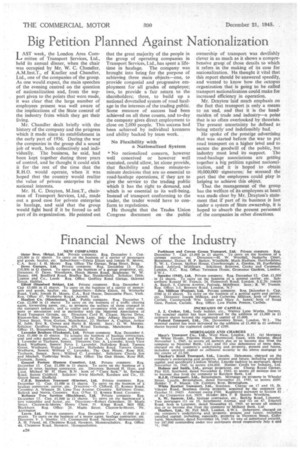Big Petition Planned Against Nationalization
Page 36

If you've noticed an error in this article please click here to report it so we can fix it.
LAST week, the London Area Committee of Transport Services, Ltd., held its annual dinner, when the chair was occupied by Mr. W. C. Chandler, A.M.Inst.T., of Kneller and Chandler, Ltd., one of the companies of the group. As one would expect, the main speeches of the evening centred on the question of nationalization and, from the support given to the points that were made, it was clear that the large number of employees present was well aware of the implications of the State control of the industry from which they get their living.
Mr_ Chandler dealt briefly with the history of the company and the progress which it made since its establishment in the early part of 1936. During the war the companies in the group did a sound job of work, both collectively and individually. The business, he said, had been kept together during three years of control, and he thought it could stick it for • the rest of the time that the R.H.O. would operate, when it was hoped that the country would realize the value of private enterprise to the national interests.
Mr. H. C. Drayton, Minst.T., chairman of Transport Services, Ltd, made out a good ease for private enterprise in haulage, and said that the group would fight hard if it be forced to sell part of its organization. He pointed out that the great majority of the people in the group of operating companies in Transport Services, Ltd., has spent a lifetime in haulage. The company was brought into being for the purpose of achieving three main objects—one, to provide congenial and progressive employment for all grades of employee; two, to provide a fair return to the shareholders; three, to build up a national dovetailed system of road haulage in the interests of the trading public. Some measure of success had been achieved on all three counts, and to-day the company gives direct employment to close on 2,000 people. This success had been achieved by individual keenness and ability backed by team work.
No Flexibility with a Nationalized System • No nationalized concern, however well conceived or however well executed, could allow, let alone provide, that flexibility and those minute-tominute decisions that are so essential to road-haulage operations, if they are to give the service to the trading public which it has the right to demand, and which is so essential to its well-being. Instead of transport conforming to the trader, the trader would have to conform to regulations.
He thought that the Trades Union Congress document on the public ownership of transport was devilishly clever in as much as it shows a comprehensive grasp, of those details to which it refers in the making of its case for nationalization. He thought it vital that this report should be-answered speedily, and wanted to know how the octopus organization that is going to be called transport nationalization could make for increased efficiency in operation.
Mr. Drayton laid much emphasis on the fact that transport is only a means to an end, and that it is the handmaiden of trade and industry—a point that is so often overlooked by theorists. The present uncertainty he defined as being -utterly and indefensibly bad.
He spoke of the prestige advertising that Was started before the war to put road transport on a higher level and to SeCtlEe the goodwill of the public, but industry must lend its support. The road-haulage associations are getting together a big petition against nationalization, and it is hoped to obtain 10,000,000 signatures; he stressed the part that the employees could play in helping to achieve this object.
That the management of the group has the welfare of its employees at heart was made clear by Mr. Drayton's statement that if part of its business is lost under a system of State ownership, it is hoped to absorb the present personnel of the companies in other directions.




























































